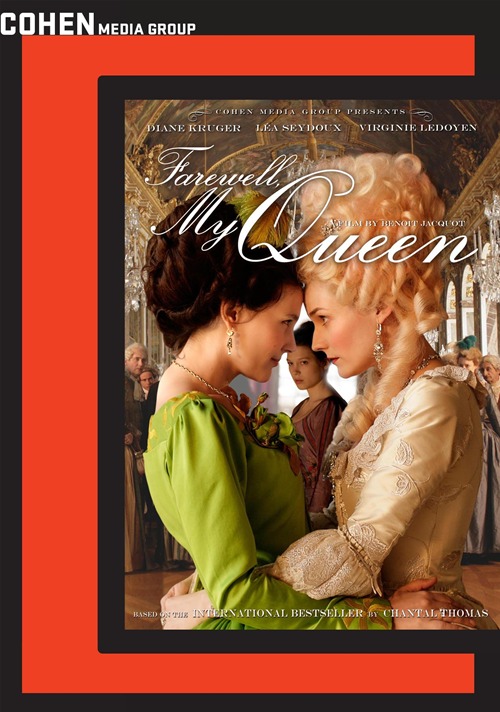CHICAGO – In anticipation of the scariest week of the year, HollywoodChicago.com launches its 2024 Movie Gifts series, which will suggest DVDs and collections for holiday giving.
DVD Review: Léa Seydoux Mesmerizes in Entrancing ‘Farewell, My Queen’
CHICAGO – Benoît Jacquot is a director clearly enraptured by the beauty of young women. This was eminently clear in his early ’90s-era vehicles for Virginie Ledoyen (“A Single Girl,” “Marianne”), an actress who turned up in his latest picture, “Farewell, My Queen,” still looking startlingly youthful. Yet she is no longer the center of Jacquot’s universe.
Taking Ledoyen’s place is 27-year-old Léa Seydoux, a smoldering French starlet harboring the remarkable ability to simultaneously appear achingly vulnerable and coldly calculating within the same take. She has such a potent presence that it earned her the role of a cardboard villain in “Mission Impossible: Ghost Protocol.” Thankfully, Jacquot realized that she was far more than a broodingly pretty face, and offered her what is truly her finest and most complex role to date.
 DVD Rating: 4.0/5.0 |
Every frame of “Farewell, My Queen” is viewed through the eyes of Sidonie (Seydoux), a 20-year-old servant girl who treasures her duties as the personal reader of Marie Antoinette (Diane Kruger). Even the scenes centering on Antoinette have a heightened, vaguely surreal quality to them, perhaps because they are being observed from Sidonie’s adoring gaze. Her infatuation with the Queen has caused her loyalty to become unwavering, even in the face of certain disaster. Based on the novel by Chantal Thomas, Jacquot’s film takes place during the four pivotal days in 1789 when Versailles was turned upside down after the fall of Bastille. It has the same impact on the kingdom that the iceberg had on the Titanic. Suddenly, Sidonie finds herself lost amongst frantic crowds, as cinematographer Romain Winding’s lens follows her through claustrophobic corridors and chillingly vacant rooms overflowing with decadent opulence. Antoinette is so convinced of Sidonie’s loyalty that she opens up to the girl about her rumored affair with the Dutchess Gabrielle de Polignac (Ledoyen). Lustful passion continues to fuel Sidonie’s every move, even as her heart threatens to crumble.

Farewell, My Queen was released on Blu-ray and DVD on January 15th, 2013.
Photo credit: Cohen Media Group
There simply weren’t five actresses in 2012 who gave performances as powerfully transfixing as Seydoux’s luminous portrayal in this film. There’s an especially haunting moment toward the end that evokes elements of Alfred Hitchcock’s “Vertigo,” as the power of illusion enables Sidonie’s dreams to come true, if only for a brief moment. The erotic tension that permeates Seydoux’s scenes with Kruger (not to mention Kruger’s scenes with Ledoyen) is amplified by Jacquot’s subtle compression of time, spare soundtrack and intent focus on the expressive faces of his beguiling actresses. This isn’t a romance so much as it is a psychological study of a young woman hopelessly devoted to a doomed icon. Even as her kindness fades behind a steely reserve, Antoniette’s eyes betray her façade of indifference in the presence of Sidonie. It’s entirely a testament to Kruger’s well-modulated performance and the script co-authored by Jacquot and Gilles Taurand that the Queen’s innermost thoughts are held entirely in check. All we’re left with is the richly layered intrigue that engulfs Versailles in its final, frenzied days. Sidonie can’t resist giving in to her voyeuristic impulses, and neither can the audience.
“Farewell, My Queen” is presented in its 2.35:1 aspect ratio and includes 22 minutes of less-than-enlightening onset interviews, though Seydoux does admit to having momentary instances of a mental “blackout,” where she simply can’t remember her lines (this apparently occurred frequently while shooting Woody Allen’s “Midnight in Paris”). Far superior is New York Film Festival director Kent Jones’s 20-minute conversation with Jacquot, who says that he changed the age of Antoinette’s historically fictitious reader from age 50 in the novel to age 20 in the film. Such is “the miracle of directing,” sighs Jacquot.
 | By MATT FAGERHOLM |


